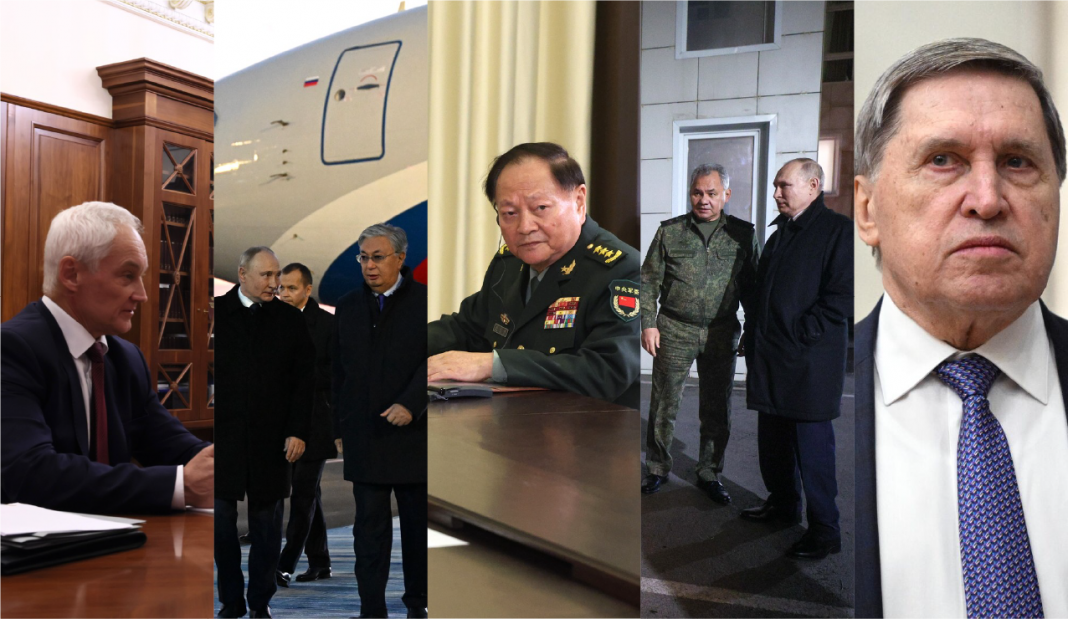This report describes the key events that significantly impacted Russia’s political, economic, and social processes.
Based on the results of the past week, the following trends can be summarised:
- Kazakhstan remains the most important partner of the Russian Federation. At the same time, Tokayev is trying to implement a multi-vector policy based on the interests of Kazakhstan. First, he is doing everything to ensure that Kazakhstan becomes one of the regional leaders in central Eurasia and to create an informal “triangle” Beijing – Moscow – Astana. Putin understands that Kazakhstan is a partner, not a vassal, and his relationship with Tokayev is respectful. Without Kazakhstan, Russia loses several advantages, including in economic relations with China. Publicly, Tokayev does not support Russia’s aggression against Ukraine; he complies with all sanctions regulations regarding Russia (at the same time, he uses workarounds to supply sanctioned goods to Russia).
- In the current situation, when it comes to possible reshuffles in the government or even a change of government, any meetings between Putin and Mishustin’s deputies are also considered from a political point of view: everyone remembers well 1999 and how, in a short time Yeltsin was prepared for a successor, making lightning-fast castlings and bringing into orbit the practically unknown Vladimir Putin, appointing him first as the chief of the FSB, and then as the head of the Government. That is why the meeting with Belousov caused a serious conspiracy theological resonance in Russia.
- The statement by Yuri Ushakov, the informal head of Russian foreign policy and the primary contact between Moscow and Washington is not the first of its kind. Similar statements were made by Putin at the Valdai Forum, by Shoigu during his visit to China, etc. But in this situation, it is essential that Ushakov emphasised one of the principles that Russia will defend in preparation for the negotiations: it will not give up territorial gains (in Ushakov’s interpretation – the “new geopolitical reality”). And if, in Shoigu’s interpretation, Russia was ready for negotiations with the West, then Ushakov again started discussing negotiations with Ukraine (obviously, this is a US requirement – compliance with all diplomatic mechanisms and rules).
This report highlights the following topics that were most relevant for Russia during 06th – 11th of November:
1. Vladimir Putin’s visit to Kazakhstan;
2. Meeting of Vladimir Putin with Andrei Belousov;
3. Meeting of Vladimir Putin with Deputy Head of the Central Military Council of China Zhang Yuxia;
4. Vladimir Putin’s visit to the headquarters of the Southern Military District;
5. New statement by Dmitry Medvedev about Ukraine;
6. Statement by Yuri Ushakov on readiness for negotiations with Ukraine.
This Content Is Only For Subscribers
- Vladimir Putin’s visit to Kazakhstan
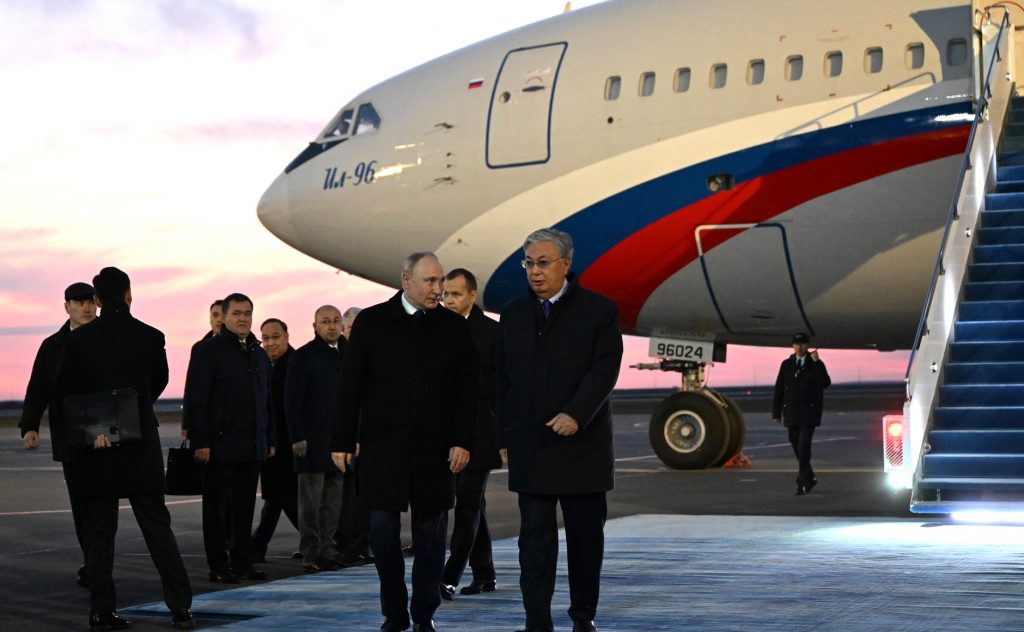
On Thursday, November 9, Vladimir Putin paid an official visit to Kazakhstan, where he took part in the Forum of Interregional Cooperation between Russia and Kazakhstan, held negotiations with President Kassym-Jomart Tokayev, and also made several statements during the final press conference. The main purpose of this visit was to discuss key issues of further development of bilateral relations of strategic partnership and alliance, prospects for interaction within the framework of integration associations in the Eurasian space, and current regional and international problems.
Also, on the eve of his visit to Kazakhstan, Vladimir Putin gave an interview for the Kazakhstanskaya Pravda newspaper, in which he declared several theses about the relationship between the two states and the region’s political situation.
Key theses of the interview:
- “Today, the partnership between Russia and Kazakhstan is particularly privileged and actively developing. It is based on the principles of mutual respect, recognition of sovereignty, territorial integrity and non-interference in internal affairs. This is confirmed, among other things, by an extensive database of documents (more than 350) regulating relations between our countries.”
- “I would especially like to note that mutual trade turnover is growing at a good pace. Last year, it increased by 10.2 per cent, to a record $28.2 billion, and in January-August of this year, it added another 7.6 per cent to $18.9 billion.”
- “Russia is one of the largest investors in the Kazakh economy. Accumulated Russian investments in Kazakhstan amount to about $17 billion. There are about 6 thousand enterprises with Russian participation in the republic.”
- “I would especially like to note that Kazakh youth are interested in learning the Russian language and receiving a Russian education. We are grateful to our partners for their keen interest in volunteering, culture and humanitarian work cooperation.”
- “Leading Russian companies: Gazprom, Rosneft, Lukoil, Tatneft – together with partners from Kazakhstan, are developing fields, building joint ventures for processing energy resources and planning to increase mutually beneficial cooperation.”
- “Let me remind you that on October 7, together with the Presidents of Kazakhstan and Uzbekistan, we participated in the ceremony to begin supplies of Russian natural gas to Uzbekistan through the territory of Kazakhstan. This route will allow the most efficient use of existing gas transportation networks. It will contribute to developing our three countries and the entire Central Asian region.”
- “As you know, the leadership of the Republic of Kazakhstan is considering the issue of building a nuclear power plant on its territory. Suppose the decision to implement this project is made. In that case, Rosatom State Corporation is ready to develop an appropriate project using the most advanced technologies in compliance with the highest environmental requirements and safety standards.”
- “It is obvious that our interaction, including in the transport and logistics, energy and humanitarian spheres, has outgrown the framework of bilateral cooperation and could benefit and be enriched even more from the combined efforts of all interested parties.”
- “The dominant trend of the current stage of world development is forming a new, more just world order based on the priority of international law. Russia considers the creation of a single space of peace, stability and prosperity in Eurasia to be an integral component of this process.”
- “We consider an important step in achieving this goal to be the creation of a broad integration framework – a large Eurasian partnership – by combining the potentials of all states and multilateral associations in the region, primarily relying on the Eurasian Economic Union and the Shanghai Cooperation Organization.”
- “I have noted more than once that we immediately developed friendly, close relations with Kassym-Zhomart Kemelevich. No wonder. We are people of the same generation and equally, feel responsible for our states. We are doing everything possible to provide a favourable environment for their confident development and prosperity, to improve the quality of life of our citizens.”
Upon arrival in Kazakhstan, Vladimir Putin, together with Kassym-Zhomart Tokayev, took part in the plenary meeting of the 19th Forum of Interregional Cooperation between Russia and Kazakhstan via video conference.
Key theses:
- Tokayev: “In general, our interaction in the trade, economic and investment sphere, and industrial cooperation shows steady growth yearly. Thus, bilateral trade turnover today has reached $27 billion, which is a record figure. The volume of direct investment from Russia exceeded $20 billion.”
- Tokayev: “The construction of a Kazakh-Russian plant for the production of butadiene with a capacity of up to 340 thousand tons per year has begun with the Tatneft company.” Negotiations on constructing an enterprise that will produce polyethene have been completed.”
- Tokayev: “Last year, the trade turnover of agricultural products between Kazakhstan and Russia increased by almost a quarter, amounting to $3.6 billion. Obviously, this is far from the limit. Our countries have enormous opportunities to expand trade and mutually beneficial cooperation in the agricultural sector.”
- Tokayev: “It is enough to note that Kazakhstan and Russia are among the largest agricultural product producers and the top ten world leaders in grain exports. Our nations account for nearly ten per cent of the world’s arable land and nine per cent of the world’s pastures and grasslands.”
- Tokayev: “Kazakhstan is one of the Islamic Organization for Food Security founders. Today, it includes 37 states with a population of about one and a half billion people. Our countries could jointly promote the export of certified halal products in this huge market, and we invite Russian businesses to close cooperation in this area.”
- Tokayev: “One of the priorities of our interaction may be the development of new logistics directions – through Central Asia – and increasing the capacity of existing routes to China. In this regard, we have planned a large-scale modernization of the Kuryk and Aktau Caspian ports. In the Chinese direction, we are already implementing a project to build second tracks on the Dostyk-Moyynty section of the railway. In total, over 1,300 kilometres of railways will be built in Kazakhstan in three years.”
- Tokayev: “In the face of unprecedented global challenges, it is more important than ever for our countries to coordinate efforts to ensure food security.”
- Putin: “Russia is one of the largest investors in the Kazakh economy, as has already been said. The total volume of Russian capital investments is a little less, a little more modest, also according to our statistics: my friend and colleague Kassym-Zhomart Kemelevich said that more than 20 billion, according to our estimates, somewhere a little more than 17 billion [dollars]. In principle, these are good numbers and good trends.”
- Putin: “I cannot help but say that the strengthening of interregional cooperation between Russia and Kazakhstan in the agricultural sector is directly facilitated by the integration processes developing in the Eurasian Economic Union. The Eurasian Economic Community member countries are working together to form common commodity markets, including agricultural ones, building all-Union production and technological chains. They are making active efforts to import substitution and digitalise mutual trade.”
After participating in the Forum, Vladimir Putin and Kassym-Jomart Tokayev held bilateral negotiations in a narrow circle. After their completion, they continued consultations with the participation of members of the two countries’ delegations.
Key theses:
- Tokayev: “Everyone knows that Kazakhstan and Russia are allies; they are strategic partners. Strong bonds of friendship, common history and close spiritual connections unite us.”
- Tokayev: “Russia is the undisputed leader in the number of enterprises with foreign capital in Kazakhstan. More than 20 thousand Russian companies are registered in our country. Twenty thousand is a severe number.”
- Tokayev: “New directions of multifaceted ties are emerging. Important documents will be signed that will make it possible to make serious progress in the fields of finance, electricity, healthcare, physical education, sports, and so on.”
- Tokayev: “All this demonstrates both the breadth of the bilateral agenda and the mutual desire of the parties to strengthen the strategic partnership. Therefore, I am optimistic about the future, with the understanding that work will continue on all fronts under our strict government supervision; I think further successes are just around the corner.”
- Putin: “The day after tomorrow marks ten years since the conclusion of the basic Treaty between Russia and Kazakhstan on good neighbourliness and alliance in the 21st century. It became a solid basis for developing our multifaceted, friendly relations. I would like to emphasise this aspect of our relations: friendly relations.”
- Putin: “We are in constant contact with the President; we have very good personal and business relations. And, of course, it helps in my work. I’m sure this will continue.”
- Putin: “We also attach great importance to the constructive interaction of our states in international affairs, which is built based on common approaches on fundamental issues. Close coordination is being carried out within the framework of the Eurasian Economic Community, the CSTO, the CIS, the United Nations, and the Shanghai Cooperation Organization, in which Kazakhstan has assumed the chairmanship since July of this year.”
Following the negotiations, the parties signed several mutual papers:
- Joint statement by the presidents of Russia and Kazakhstan on the tenth anniversary of the signing of the Treaty between the Russian Federation and the Republic of Kazakhstan on good neighbourliness and alliance in the 21st century.
- Plan of joint actions of the Russian Federation and the Republic of Kazakhstan for 2024–2026.
- Memorandum of understanding between the Ministry of Energy of the Russian Federation and the Ministry of Energy of the Republic of Kazakhstan on cooperation on the construction projects of the Kokshetau Thermal Power Plant, the Semey Thermal Power Plant and the Ust-Kamenogorsk Thermal Power Plant (Republic of Kazakhstan).
- Action plan for developing cooperation in physical culture and sports between the Russian Federation and the Republic of Kazakhstan for 2024–2026.
- Joint action plan for interaction between the Federal Customs Service (RF) and the State Revenue Committee of the Ministry of Finance of the Republic of Kazakhstan with the participation of representative offices of the customs services of the Russian Federation and the Republic of Kazakhstan for 2024–2025.
- Memorandum of understanding and cooperation on labour inspection issues between the Federal Service for Labor and Employment (RF) and the Committee of Labor and Social Protection of the Ministry of Labor and Social Protection of the Population of the Republic of Kazakhstan.
- Agreement on information partnership between the federal state unitary enterprise “Information Telegraph Agency of Russia (ITAR-TASS)” and the RSE on the PVC “Teleradio complex of the President of the Republic of Kazakhstan” UDP RK.
Also, following the results of Putin’s visit to Kazakhstan, the presidents held a joint press conference.
Key theses:
- Tokayev: “Russia is a strategic partner and ally of Kazakhstan. Based on the unshakable values of a common history, lasting friendship, mutual respect and trust, we have built interstate relations that exemplify implementing mutual interests in many areas. Taking this opportunity, I would like to confirm Kazakhstan’s commitment to the strategic course for further deepening multifaceted cooperation with Russia.”
- Tokayev: “Particular attention was paid to trade, economic and investment interaction, which has recently shown steady growth. Russia confidently maintains its status as Kazakhstan’s largest trade and economic partner. Over the past three years, the volume of mutual trade between our countries has increased by more than 30 per cent. Last year, according to Kazakhstan statistics, trade turnover amounted to a record 27 billion dollars.”
- Tokayev: “In addition, we discussed cooperation in the energy field and the progress of implementation of large oil and gas projects. It is important to further develop the project for the supply of Russian gas in southern directions, as well as to increase the volume of transit of Russian oil to China through Kazakhstan.”
- Tokayev: “Today, we also exchanged views on current regional and global issues. Vladimir Vladimirovich shared his point of view, which, of course, is of great political and practical interest for Kazakhstan.”
- Putin: “It is important that the just signed Joint Statement and the adopted three-year Action Plan between Russia and Kazakhstan set truly ambitious goals for further strengthening the comprehensive strategic partnership.”
- Putin: “Russian-Kazakh ties in the field of peaceful nuclear energy are thriving. There are joint ventures for the extraction and enrichment of uranium.”
- Putin: “I have already said publicly, I can repeat, what is very important for us. Our economy is growing, this year there will be growth – not the same, of course, as in Kazakhstan, more than five per cent – but for the Russian economy today and for the Russian economy in general, three per cent growth is decent.”
- Putin: “We spoke with Kassym-Zhomart Kemelevich about strengthening military, military-technical cooperation. We are members of the CSTO. Russia greatly assists Kazakhstan in training military personnel, specialists in the Ministry of Defense universities and other law enforcement agencies. With our assistance, licensed production and servicing of Russian military equipment has been organised on the republic’s territory.”
Outcomes and outlook:
Kazakhstan remains the most important partner of the Russian Federation. At the same time, Tokayev is trying to implement a multi-vector policy based on the interests of Kazakhstan. First, he is doing everything to ensure that Kazakhstan becomes not only one of the regional leaders in central Eurasia but also to create an informal “triangle” Beijing – Moscow – Astana. Putin understands that Kazakhstan is a partner, not a vassal, and his relationship with Tokayev is respectful. Without Kazakhstan, Russia loses several advantages, including in economic relations with China.
It is wrong to believe that Kazakhstan is distancing itself from Russia – on the contrary, it is doing everything to become perhaps the primary communicator with Central Asia. Kazakhstan is not going to leave the CIS, CSTO, EAEU and other structures initiated by Russia – it receives maximum economic benefits from them and, sometimes (as during the bloody riots in January 2022) – political ones. At the same time, Kazakhstan demonstrates that it has a special opinion on several issues: Tokayev does not support Russia’s aggression against Ukraine and complies with all sanctions regulations regarding Russia (at the same time, using workarounds to supply sanctioned goods to Russia).
Thus, Putin’s visit to Kazakhstan is a truly important, and not a decorative, political step on which the security of the Russian economy in the southern direction will largely depend.
- Meeting of Vladimir Putin with Andrei Belousov
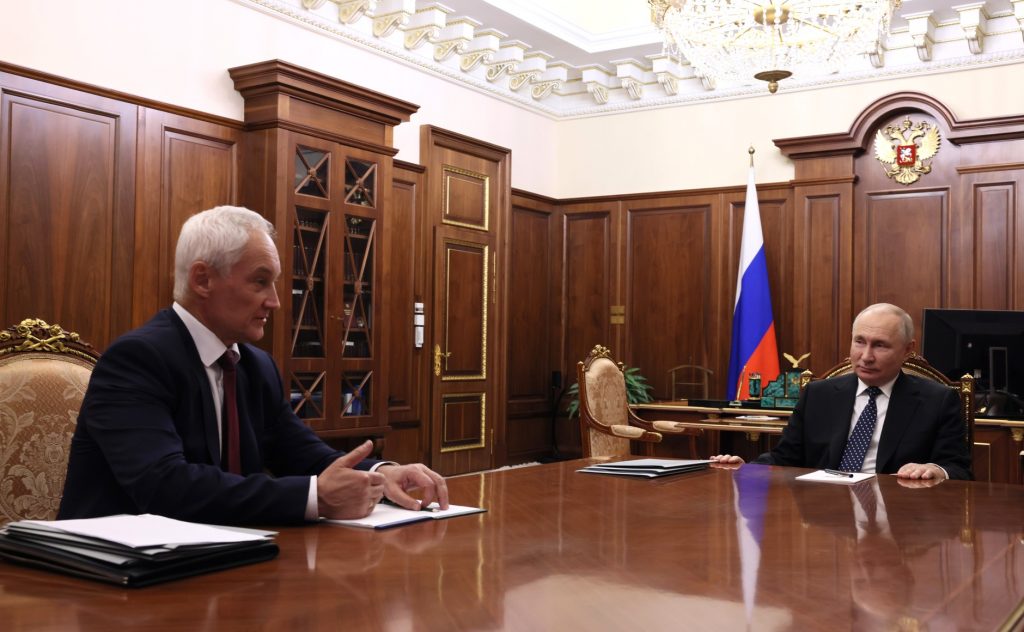
On Tuesday, November 7, Vladimir Putin held a meeting with First Deputy Prime Minister Andrei Belousov, during which a report was heard on the progress of work on the technology policy bill. In particular, Belousov summed up the results of Putin’s recent order, according to which the Government of the Russian Federation adopted the Concept of Technological Development and began to develop a law on technology policy, consolidating the main ideas and concepts of the approved document.
Key theses:
- Belousov: “A very important point, from our point of view, is the so-called projects of technological sovereignty. We are talking about the largest projects – more than 10 billion rubles of investment- aimed at creating a specific product line. Examples of such projects are machine tool manufacturing, microelectronics, unmanned aircraft systems, diesel engineering, certain types of chemistry, medical equipment, pharmaceuticals, and so on.”
- Belousov: “The second novel is projects of so-called end-to-end technologies. That is, those technologies that are breakthroughs today, as a rule, will determine the appearance of production systems in the coming years and sometimes decades. The classic example that we are already accustomed to is artificial intelligence.”
- Belousov: “And the third novelty is putting the development of small technology companies on a solid legal basis.”
- Belousov: “A few days ago, I met with law enforcement agencies regarding the so-called right to risk, which is a very important element of this law, and we also found a common understanding with both the Federal Security Service and the Ministry of Internal Affairs.”
Outcomes and outlook:
Mr Belousov is the second person in the government, responsible specifically for technological breakthroughs and reforming the Russian economy. A former assistant to the president, the son of the chief architect of the “Kosygin reforms” of the 60s and 70s of the twentieth century, Rem Belousov, he enjoys Putin’s full confidence, and the Mishustin government is more likely the Mishustin-Belousov government.
In the current situation, when it comes to possible reshuffles in the government or even a change of government, any meetings between Putin and Mishustin’s deputies are also considered from a political point of view: everyone remembers well 1999 and how, in a short time Yeltsin was prepared for a successor, making lightning-fast castlings and bringing into orbit the practically unknown Vladimir Putin, appointing him first as the chief of the FSB, and then as the head of the Government. That is why the meeting with Belousov caused a serious conspiracy theological resonance in Russia.
- Meeting of Vladimir Putin with Deputy Head of the Central Military Council of China Zhang Yuxia
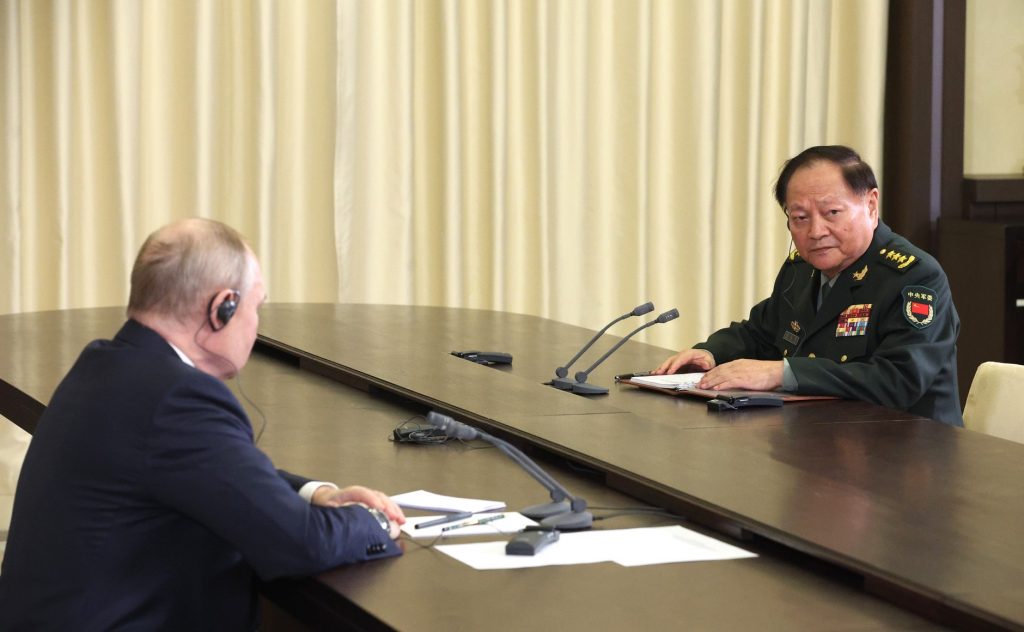
On Wednesday, November 8, at the country residence of Russian President Novo-Ogaryovo, Putin met with the Deputy Chairman of the Central Military Council of the People’s Republic of China, Zhang Yuxia. On the Russian side, the meeting was also attended by Defense Minister Sergei Shoigu, who carried out a working visit to China last week, where he also held several meetings.
Key theses:
- Putin: “Not so long ago, I was in Beijing myself, and I would immediately like to ask you to convey to the Chairman of the People’s Republic of China your best wishes and words of gratitude for the warm welcome.”
- Putin: “Russia and China are not building any military alliances following the example of the Cold War, and our interaction with you is constructive and is a serious factor in stabilising the international situation.”
- Putin: “We also work in the economic sphere, and quite effectively. Trade and economic ties are developing at a good pace, and we are achieving the goals we have set for ourselves ahead of time.”
- Putin: “And of course, our cooperation, our contacts in the military and military-technical sphere must be becoming increasingly important. As for military-technical matters, here, of course, our work in high-tech areas comes first. I also mean space, including high-orbit groupings, and I also mean modern types of weapons. Such weapons will certainly ensure the strategic security of both Russia and the People’s Republic of China.”
- Putin: “More and more, the United States is drawing all the countries of the allianc• Putin: “Not so long ago, I was in Beijing myself, and I would immediately like to ask you to convey to the Chairman of the People’s Republic of China your best wishes and words of gratitude for the warm welcome.”
- Putin: “Russia and China are not building any military alliances following the example of the Cold War, and our interaction with you is constructive and is a serious factor in stabilising the international situation.”
- Putin: “We also work in the economic sphere, and quite effectively. Trade and economic ties are developing at a good pace, and we are achieving the goals we have set for ourselves ahead of time.”
- Putin: “And of course, it is important that our cooperation, our contacts in the military and military-technical sphere are becoming increasingly important. As for military-technical matters, here, of course, our work in high-tech areas comes first. I also mean space, including high-orbit groupings, and I also mean modern types of weapons, promising ones, which will certainly ensure the strategic security of both Russia and the People’s Republic of China.”
- Putin: “More and more, the United States is drawing all the countries of the alliance into creating a tense situation in the Asia-Pacific region, trying to create new military-political alliances there, including the countries of the region, and, first of all, guided, of course, by its own, I will say frankly, selfish interests.”
- Zhang Yuxia: “First of all, let me convey my warmest greetings and best wishes on behalf of President Xi Jinping.”
- Zhang Yuxia: “The Russian Federation under your leadership has stubbornly stood in the face of extreme Western sanctions, which shows that no difficulty bends you and Russia. For this, the Chinese side expresses respect.”
- Zhang Yuxia: “This time, we came to Russia to implement your important agreements with Chairman Xi, hold the next meeting on military-technical cooperation and further strengthen bilateral military cooperation.”
Outcomes and outlook:
Zhang Yuxia’s visit is a response to Sergei Shoigu’s recent similar visit to Beijing. The fact that the defence ministers of the two countries, contrary to the existing protocol, are received by the heads of state is evidence that both China and Russia have great hopes for creating and strengthening the military-technical and military-strategic alliance, which many sources have reported in recent years. Thus, it can be assumed that the negotiation process for creating a “Eurasian anti-NATO” may be at its final stage.
In addition, it is important for both China and Russia to understand how to act in the face of a possible attack (and subsequent aggression) by the United States and other NATO states, as well as Israel, against Iran, which is seen as a possible ally of Russia and China in the great Eurasian game. Thus, both Shoigu’s and Zhang’s visits are very important for predicting the further development of the situation in the region and on the planet.
- Vladimir Putin’s visit to the headquarters of the Southern Military District
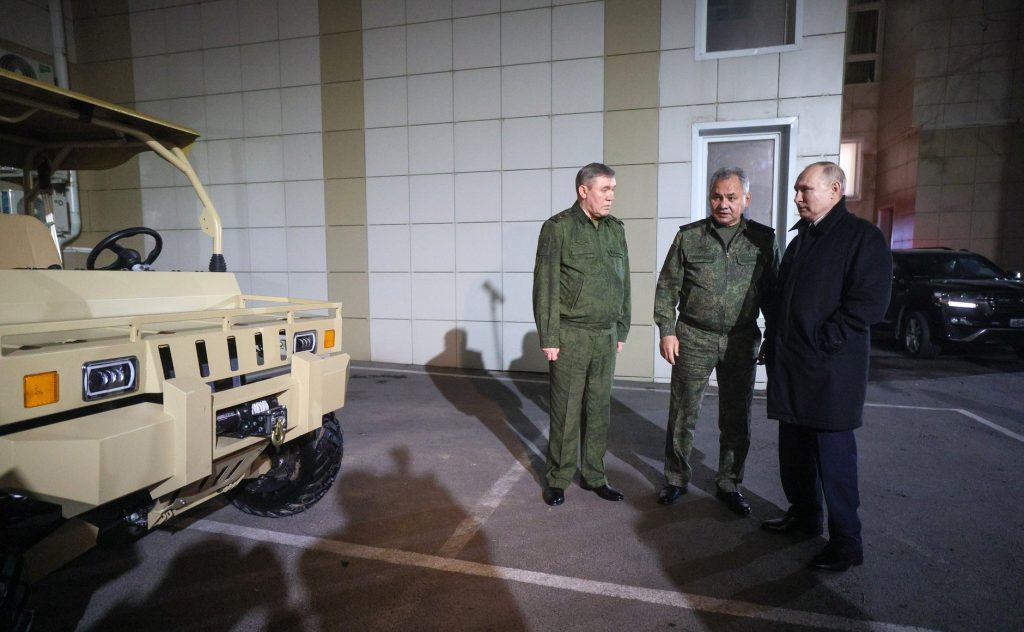
On Friday, November 10, returning from an official visit to Kazakhstan, Vladimir Putin arrived in Rostov-on-Don, where he visited the headquarters of the Southern Military District. According to official data, during his next visit to Rostov-on-Don, Putin held meetings with Defense Minister Sergei Shoigu, Chief of the General Staff Valery Gerasimov, as well as with other military leaders. At the same time, it is noted that Putin managed to get acquainted with new models of military equipment and listen to reports on the progress of the so-called “SMO”.
It is worth noting that Putin’s previous visit to the headquarters of the Southern Military District took place on October 20. Earlier, he tried to visit Rostov-on-Don once a month.
Outcomes and outlook:
Putin continues to demonstrate that the so-called “SMO” is under his control. After Surovikin’s resignation, Putin decided to demonstratively take command upon himself, thus increasing his status in the eyes of Russian citizens and debunking the versions launched by the opposition that “Putin hid in a bunker in the Urals and is afraid to come out.” For him, this is primarily an image move and action aimed at strengthening discipline in the troops.
- New statement by Dmitry Medvedev about Ukraine
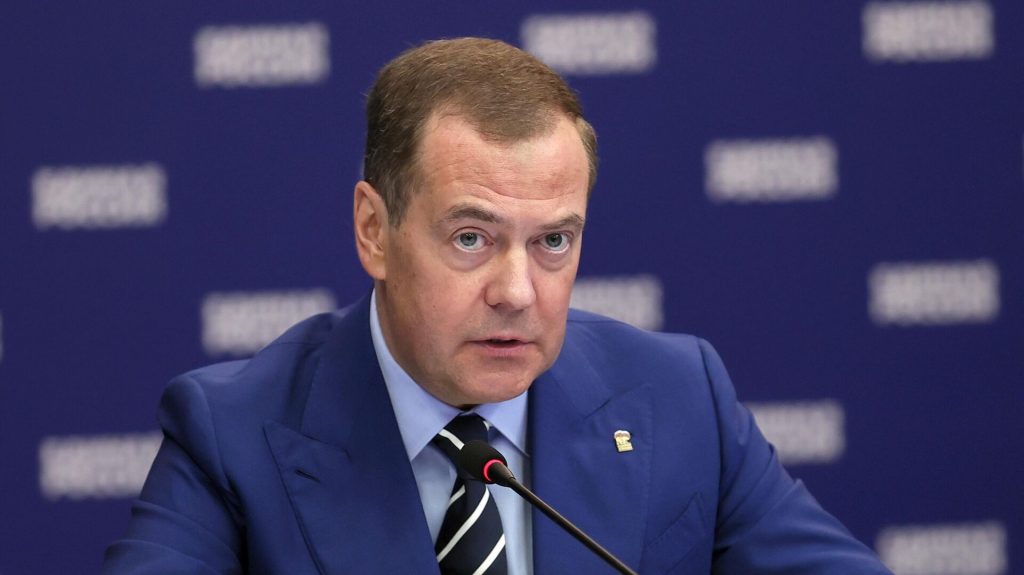
On Sunday, November 12, Deputy Chairman of the Security Council of the Russian Federation Dmitry Medvedev published another post on his Telegram channel, in which he spoke sharply about the situation in Ukraine and also, in his usual manner, stated that such a country does not exist. At the same time, his main message concerned the need for further advance of Russian occupation forces across the territory of Ukraine, with the possibility of capturing Odesa and other regions in the south of Ukraine.
Key theses:
- “Under the guise of big Middle Eastern blood, some current and former NATO officials are carefully spreading new ideas about Ukraine. Like, we need to accept it into the Alliance, but without Crimea and Donbas. Therefore, these territories are definitely no longer Ukraine in their understanding.”
- “Not bad, but it’s important to move on. We must admit that Odesa, Mykolaiv, Kyiv, and practically everything else is not Ukraine at all.”
- “What then should we admit to NATO, you ask? We can accept the city of Lemberg with its surroundings (still the Lviv Oblast) if they insist there.”
Outcomes and outlook:
This is not the first time that Dmitry Medvedev has demonstrated that in the new near-Kremlin political configuration, he is assigned the role of “Zhirinovsky 2.0.” As the leader of the “war party,” he must send signals that can be read unambiguously in the West: if Putin leaves, a group of people with radically inadequate thinking may come to power, from whom one can expect anything – an imperialist campaign in the West, and the use of nuclear weapons. That is why Medvedev’s statements must be viewed solely through the prism of the Kremlin’s big psychological game designed to intimidate the West.
- Statement by Yuri Ushakov on readiness for negotiations with Ukraine
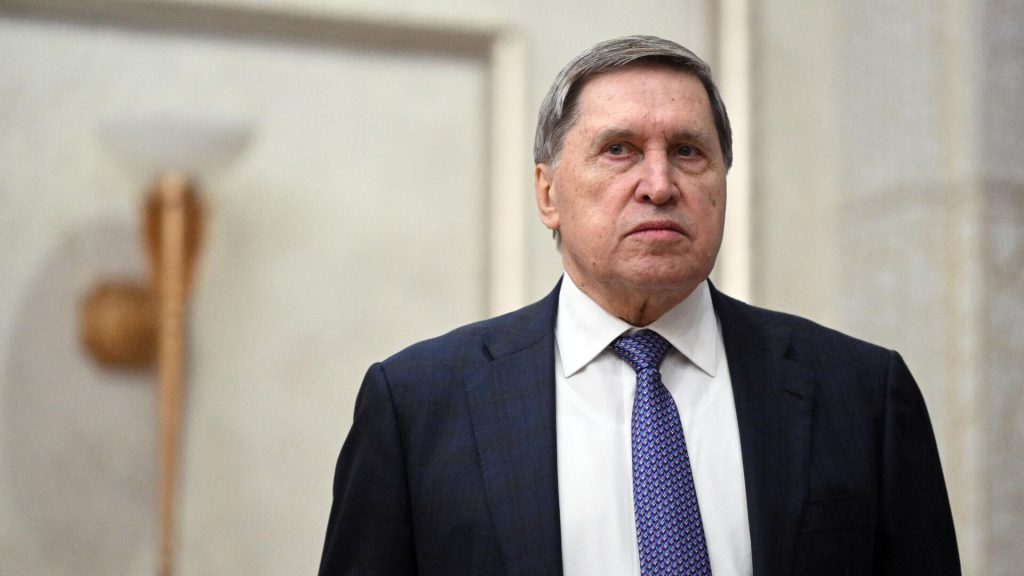
On Friday, November 9, Assistant to the President of the Russian Federation Yuri Ushakov, answering questions from journalists, said that Russia is ready for negotiations with Ukraine. Still, such desires do not come from Kyiv: “Russia is ready for negotiations with Ukraine, but there has been no sign from the Ukrainian side in recent months; there were even hints of new contacts with the Russian Federation.” In this case, it is important to note that such statements from Russia have begun to be heard much more often. Thus, a week earlier, Russian Defense Minister Sergei Shoigu announced his readiness for negotiations on Ukraine.
Outcomes and outlook:
The statement by Yuri Ushakov, the informal head of Russian foreign policy and the primary contact between Moscow and Washington, is not the first of its kind. Similar statements were made by Putin at the Valdai Forum, by Shoigu during his visit to China, etc. But in this situation, it is essential that Ushakov emphasised one of the principles that Russia will defend in preparation for the negotiations: it will not give up territorial gains (in Ushakov’s interpretation – the “new geopolitical reality”). And if, in Shoigu’s version, Russia was ready for negotiations with the West, then Ushakov again started talking about negotiations with Ukraine (obviously, this is a US requirement – compliance with all diplomatic mechanisms and rules).
Interestingly, Ushakov’s statement came on the eve of the visit of Andrei Ermak to the United States and Jake Sullivan to Kyiv, as well as a few days before the meeting of Joe Biden and Xi Jinping in San Francisco. That is, the parties sent signals regarding their readiness to de-escalate. Now, the question is about official Kyiv and the compensatory mechanisms that can be offered to Ukraine.

